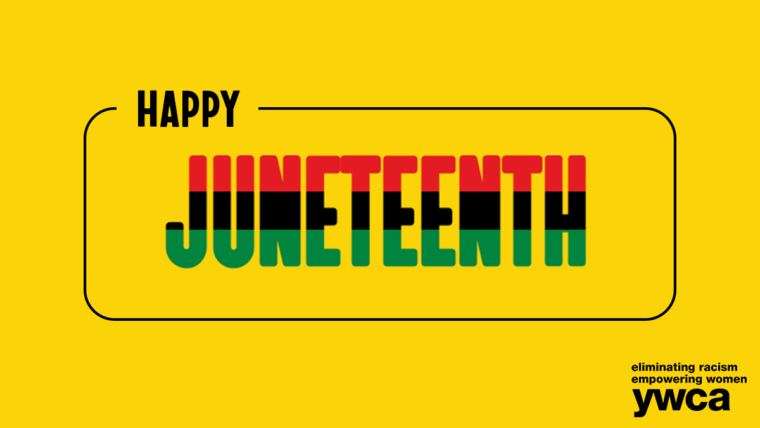Juneteenth 2023

“Freedom is never voluntarily given by the oppressor; it must be demanded by the oppressed.”
-Martin Luther King-
“[Juneteenth] gives us an opportunity to remember that American democracy has more authors than the shrewd lawyers and erudite farmer-philosophers of the Revolution, that our experiment in liberty owes as much to the men and women who toiled in bondage as it does to anyone else in this nation’s history.”
-Jamelle Bouie-
June 19 is Juneteenth National Independence Day, a federal holiday commemorating the long-overdue emancipation of enslaved Americans in 1865. On Juneteenth we center the experiences of Black Americans in the struggle for freedom, and celebrate this important milestone in the fight for racial justice. Chattel slavery (the system in which people were considered legal property that could be bought, sold, and owned) did not end when President Abraham Lincoln issued the Emancipation Proclamation in 1863. Enslavers prevented the news of freedom from reaching the people they enslaved even after the Civil War ended in April 1865. It was not until June 19, 1865 that Union troops arrived in the furthest reaches of the former Confederacy to announce and enforce the end of slavery. It was not until this Juneteenth—two years after their freedom had been declared—that Black people in Texas could finally embrace and celebrate their hard won freedom.
Each year on June 19, we join that celebration—of the true end of chattel slavery and the real, felt arrival of freedom—and lift up the experiences of Black Americans like Laura Smalley, who was only a child when, in her words, “freedom broke.” In a 1941 interview, Smalley recalled when her enslaver Mr. Bethany returned from a long absence when Smalley was about 10 years old. At the time she was too young to realize he was returning at the end of the Civil War, and the Confederacy had been defeated. Smalley recalled that “old master didn’t tell, you know, they was free” and “worked them” for months until he was forced to “turn them loose on the nineteenth of June. That’s why, you know, we celebrate that day.” At the time young Smalley didn’t know why her community was celebrating, but decades later she still remembered the “big dinner…on the nineteenth” with “a long table” laden with “everything you want to eat and drink.”[1]
Today Juneteenth is an opportunity to celebrate and reflect. It’s a day for us to set our own long tables to celebrate the long overdue joy that Black Americans felt at the real arrival of freedom, and to strengthen our own commitment to racial justice—to doing all that we can to end the racist legacies of slavery and forge a path of freedom and dignity for all people.
To learn more about Juneteenth:
- Read journalist Jamelle Bouie explain “Why Juneteenth Matters” (The New York Times, 2020)
- Read (local!) historian Dr. Kate Masur explain how “Juneteenth Reminds Us Just How Far We Have to Go” (The New York Times, 2021)
- Listen to Laura Smalley remember her life in slavery and the arrival of freedom on June 19, 1865 (Library of Congress)
[1] John Henry Faulk, Laura Smalley, and Unidentified Female Interviewer, “Interview with Laura Smalley, Hempstead, Texas, 1941,” Retrieved from the Library of Congress, https://www.loc.gov/item/afc1941016_afs05496a/.
